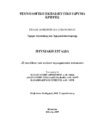| heal.creatorName | Αναπλιώτης, Νικόλαος-Ραφαήλ | el |
| heal.creatorName | Καραγιάννης, Δημήτριος | el |
| heal.creatorName | Καραμολέγκος, Χρήστος | el |
| heal.creatorName | Anapliotis, Nikolaos-Rafail | en |
| heal.creatorName | Karagiannis, Dimitrios | en |
| heal.creatorName | Karamolegkos, Christos | en |
| heal.publicationDate | 2019-08-19 | |
| heal.identifier.primary | http://hdl.handle.net/20.500.12688/9200 | |
| heal.abstract | Σκοπός: Διερευνούμε εάν η ευπάθεια της Ευρωπαϊκής Οικονομικής και Νομισματικής Ένωσης (Ε-ΟΝΕ) συνέβαλλε στη διόγκωση του προβλήματος της υπερχρέωσης του Ελληνικού δημόσιου τομέα, με αποτέλεσμα τις ολέθριες επιλογές μετά το 2010.
Μεθοδολογία: Αναλύουμε τη σχετική θεωρία των Άριστων Νομισματικών Περιοχών (ΑΝΠ) καθώς και τα σχετικά υποδείγματα ευπάθειας των Ατελών Νομισματικών Ενώσεων, τα συνθέτουμε με τα γεγονότα και παρουσιάζουμε τις κρίσεις μας επί του θέματος.
Ευρήματα: Η κρίση δημόσιου χρέους που αντιμετώπισε η Ελλάδα εντός της Ε-ΟΝΕ προκάλεσε «οιονεί-έξοδο της Ελλάδας από την Ευρωζώνη». Επίσης, η Ελλάδα δεν ήταν δημοσιονομικά ώριμη για να ενταχθεί σε μια ατελή νομισματική ένωση, όπου η «δημοσιονομική πειθαρχεία», στη λογική των πολιτικών there is no-alternative (TINA), ήταν ο μόνος ουσιαστικός προστατευτικός μηχανισμός διόγκωσης χρέους και ελλειμάτων. Τέλος, διαπιστώσαμε ότι η απουσία ουσιαστικού «δανειστή εσχάτης ανάγκης», απέκλεισε ουσιαστικά το Ελληνικό τραπεζικό σύστημα από τη «φυσική ροή» αναχρηματοδότησης του από τη διατραπεζική της Ευρωζώνης με αναπόφευκτο άμεσο στραγγαλισμό των ελληνικών επιχειρήσεων. Επομένως, το βασικό μας συμπέρασμα είναι πως οι πολιτικές λιτότητας «έδωσαν φάρμακο χειρότερο της ασθένειας της Ελληνικής οικονομίας».
Περιορισμοί: Η εμπειρική μας διερεύνηση είναι στο πεδίο μόνο της περιγραφικής στατιστικής, με αποτέλεσμα τα συμπεράσματά μας να αφορούν μόνο τα δεδομένα μας, χωρίς δυνατότητα προβλέψεων.
Επιπτώσεις πολιτικής: Εκτιμούμε ότι οι πολιτικές λιτότητας που εφαρμόστηκαν στη χώρα μας εν είδει «πειραματόζωου» στην Ευρωζώνη, δεδομένων και των πρόσφατων απολογητικών εκθέσεων του ΔΝΤ, θα πρέπει να λειτουργούν ως «παράδειγμα προς αποφυγή». | el |
| heal.abstract | Purpose: We investigate whether the vulnerability of the European Economic and Monetary Union (Ε-EMU) contributed to the expansion of the issue of excessive indebtedness of the Greek public sector, resulting in disastrous choices in the following years after 2010.
Methodology: We analyse the relevant theories of the Optimum Currency Areas (OCU) as well as the vulnerabilities of an imperfect monetary union, we compose them in adjunction with facts and present our judgments on the subjects.
Findings: The sovereign debt crisis Greece faced within the E-EMU caused "quasi-exodus of Greece from the eurozone". Also, Greece was not financially mature to join an imperfect monetary union, where "fiscal discipline", in the logic of policies there is no-alternative (TINA), was the only essential protective mechanism against the increase of public debt and deficits. Finally, we found that the absence of a substantial "lender of emergency", effectively ruled out the Greek banking system from its "natural flow" of refinancing from the euro area interbank with the inevitable direct strangulation of the Greek business sector. Therefore, our main conclusion is that austerity policies "gave a drug worse than the disease facing the Greek economy".
Limitations: Our empirical investigation is in the field of descriptive statistics, therefore this means that our findings relate only to our data, without predictability.
Policy implications: We believe that the austerity policies implemented in our country made us a "guinea pig" of the eurozone, given the recent IMF reports and should be viewed from now on as a bad example to follow when a country is faced with a similar crisis. | en |
| heal.language | Ελληνικά | el |
| heal.language | Greek | en |
| heal.academicPublisher | Τ.Ε.Ι. Κρήτης, Σχολή Διοίκησης και Οικονομίας (Σ.Δ.Ο), Τμήμα Λογιστικής και Χρηματοοικονομικής | el |
| heal.academicPublisher | T.E.I. of Crete, School of Management and Economics (SDO), Department of Accounting and Finance | en |
| heal.title | Η ευπάθεια των ατελών νομισματικών ενώσεων. | el |
| heal.title | The vulnerability of incomplete monetary unions. | en |
| heal.type | Πτυχιακή Εργασία | el |
| heal.type | Bachelor thesis | en |
| heal.keyword | νομισματική ένωση, Οικονομική και Νομισματική Ένωση (ΟΝΕ), δημόσιο χρέος, δημοσιονομική πολιτική, οικονομική κρίση, Ελλάδα | el |
| heal.keyword | monetary union, Economic and Monetary Union (EMU), public debt, fiscal policy, economic crisis, Greece | en |
| heal.access | free | el |
| heal.advisorName | Σταματόπουλος, Θεόδωρος | el |
| heal.advisorName | Stamatopoulos, Theodoros | en |
| heal.advisorID.email | stamth@staff.teicrete.gr | |
| heal.academicPublisherID | Τ.Ε.Ι. Κρήτης | el |
| heal.academicPublisherID | T.E.I. of Crete | en |
| heal.fullTextAvailability | true | el |
| tcd.distinguished | false | el |
| tcd.survey | false | el |


